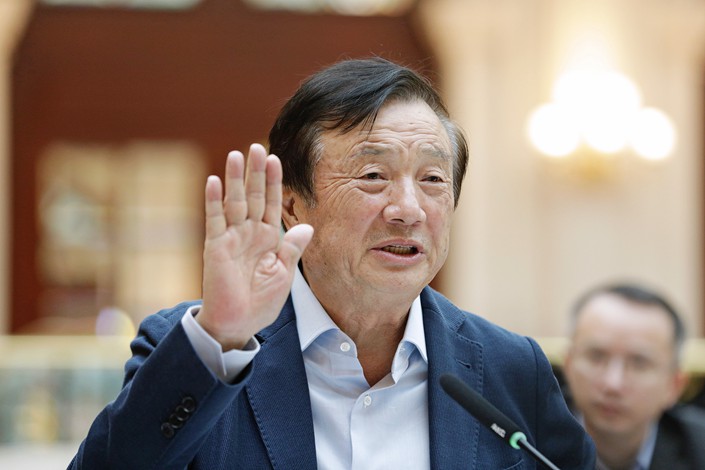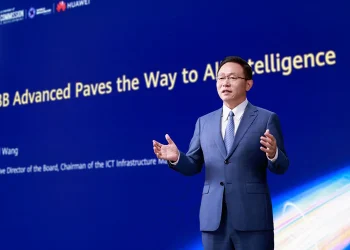Huawei’s Ren Zhengfei Emerges as China’s Tech Champion in Face of U.S. Sanctions
China’s tech trajectory is shifting gears—right from the front page of the People’s Daily. In a rare and high-profile interview published on June 10, 2025, Huawei founder Ren Zhengfei signaled Beijing’s renewed embrace of private enterprise as a driving force behind national innovation, just as trade tensions between the U.S. and China escalate.
Ren’s placement on China’s most influential state-run newspaper is no accident. Analysts see this as a deliberate endorsement from Xi Jinping, meant to reassure both domestic and international audiences that China hasn’t sidelined its private tech sector—it’s reenergizing it. The message: private companies like Huawei are now central to countering U.S. chip export controls and reclaiming technological sovereignty.
Ren’s defiant tone is clear. He acknowledges Huawei’s lag behind U.S. chipmakers but insists that innovation—through basic research, mathematical modeling, and high-performance computing—will close the gap. “Don’t think about difficulty—just do it,” he urges China’s scientists, casting long-term effort as a patriotic duty.
Private Tech, Public Goals: Huawei’s Dual Role
For much of the 2020s, China’s private tech giants faced regulatory crackdowns. But with global supply chains disrupted by COVID-19 and the U.S. doubling down on export restrictions, the narrative has changed. Ren’s interview reframes private firms not as threats but as allies in China’s geopolitical contest with the West.
Yet Huawei remains unique. Its blend of government support, quasi-military structure, and global ambitions makes it less a startup success story and more a model of “state-guided entrepreneurship.” Huawei invests over $8 billion annually into basic research—one-third of its R&D budget—betting on breakthroughs with no guaranteed commercial return. Ren likens this to planting roots, warning that without a scientific foundation, China’s tech tree could be uprooted by the winds of global competition.
AI Ambitions and Scientific Patriotism
The timing of Ren’s remarks also aligns with China’s strategic shift in AI. With domestic firms like DeepSeek rivaling GPT-4, the Chinese state is uniting top private players into a “National AI Team” to accelerate innovation. Open platforms and public-private collaboration are taking precedence over Silicon Valley’s closed models.
Ren’s emphasis on long-term scientific investments echoes China’s history. Just as Deng Xiaoping harnessed science for modernization in 1978, Xi is now leveraging “science nationalism” to rally national unity and bolster global competitiveness—especially as growth slows and decoupling deepens.
Openness with Chinese Characteristics
“The more open a country is, the more it drives progress,” reads the article’s headline. But while China promotes technological openness, political control remains tight. Strict content and AI regulations still restrict free expression, reinforcing the Party’s dominance even as it invites international partnerships.
This contradiction is strategic. China seeks scientific exchange and foreign collaboration—but on its own terms. Through Ren’s civilian voice, Beijing delivers a softer yet firm message: China is open to innovation, not interference.
A Response to Washington’s Tech Containment
Ren’s remarks also serve as a pointed response to the U.S.’s expanding export restrictions on Huawei, AI chips, and semiconductor tools. Despite the pressure, Huawei has resumed 5G phone production, launched new AI chips, and expanded its domestic fab network. It’s not business as usual—but it’s certainly not defeat.
U.S. policymakers should take note: rather than isolating China, sanctions have ignited a wave of internal innovation. Huawei’s adaptive strategies and China’s AI pivot demonstrate a growing capacity for homegrown solutions.
Conclusion: A New Balance of Competition and Coexistence
As Ren takes center stage, China signals confidence without complacency. The Party retains control, but it’s opening space for entrepreneurial resilience. It’s a recalibration—not retreat.
In the broader tech race, the U.S. must focus on its own strengths: world-class universities, open scientific ecosystems, and risk-friendly innovation policies. Competing by closing doors risks losing what made American technology dominant in the first place.
Ultimately, the future won’t be shaped by who can impose more restrictions—but by who can build more open, innovative, and adaptable systems. Ren Zhengfei’s message is a wake-up call—for China, for America, and for a world increasingly defined by technology and power.https://www.youtube.com/watch?v=QWmSLwdgXOc








